Analysis of Management and Operations: Uber Case Study Report
VerifiedAdded on 2022/12/30
|12
|3759
|48
Report
AI Summary
This report provides a comprehensive analysis of management and operations, using Uber as a case study. It begins by defining the roles and characteristics of leaders and managers, including delegation, communication, and motivation. The report then explores how leadership and management functions apply in different situational contexts, such as planning, employee engagement, and change management. Various leadership styles, including situational, systems, and contingent leadership, are examined. The report further delves into approaches to operations management, such as Total Quality Management (TQM), Just in Time (JIT), and Six Sigma, highlighting the roles of leaders and managers in their implementation. The importance of operations management in achieving business objectives is discussed, along with an assessment of the impact of business environment factors on operations management and decision-making. The report concludes with a summary of the key findings and insights into effective management and leadership strategies in the context of a dynamic business environment.
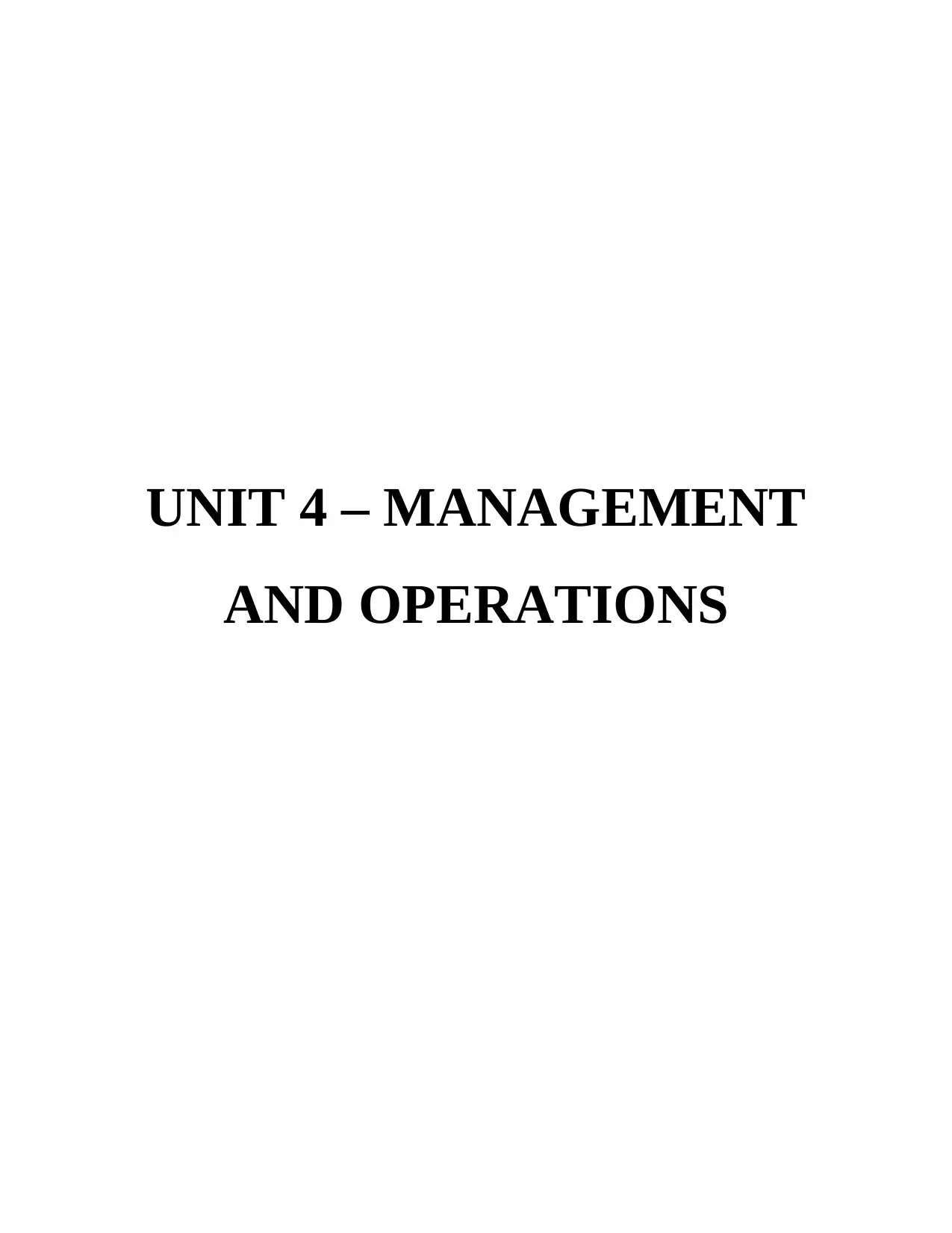
UNIT 4 – MANAGEMENT
AND OPERATIONS
AND OPERATIONS
Paraphrase This Document
Need a fresh take? Get an instant paraphrase of this document with our AI Paraphraser
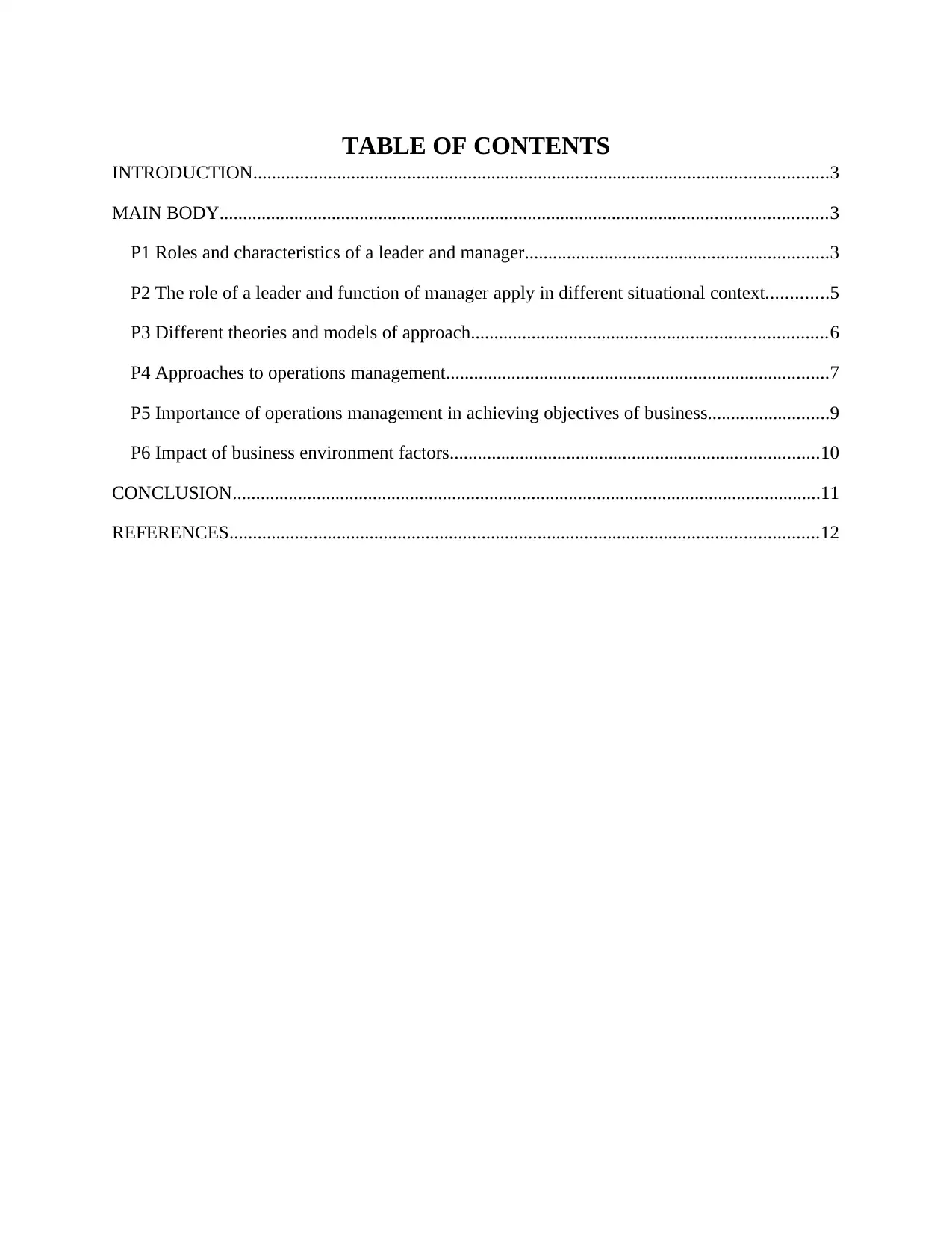
TABLE OF CONTENTS
INTRODUCTION...........................................................................................................................3
MAIN BODY..................................................................................................................................3
P1 Roles and characteristics of a leader and manager.................................................................3
P2 The role of a leader and function of manager apply in different situational context.............5
P3 Different theories and models of approach............................................................................6
P4 Approaches to operations management..................................................................................7
P5 Importance of operations management in achieving objectives of business..........................9
P6 Impact of business environment factors...............................................................................10
CONCLUSION..............................................................................................................................11
REFERENCES..............................................................................................................................12
INTRODUCTION...........................................................................................................................3
MAIN BODY..................................................................................................................................3
P1 Roles and characteristics of a leader and manager.................................................................3
P2 The role of a leader and function of manager apply in different situational context.............5
P3 Different theories and models of approach............................................................................6
P4 Approaches to operations management..................................................................................7
P5 Importance of operations management in achieving objectives of business..........................9
P6 Impact of business environment factors...............................................................................10
CONCLUSION..............................................................................................................................11
REFERENCES..............................................................................................................................12
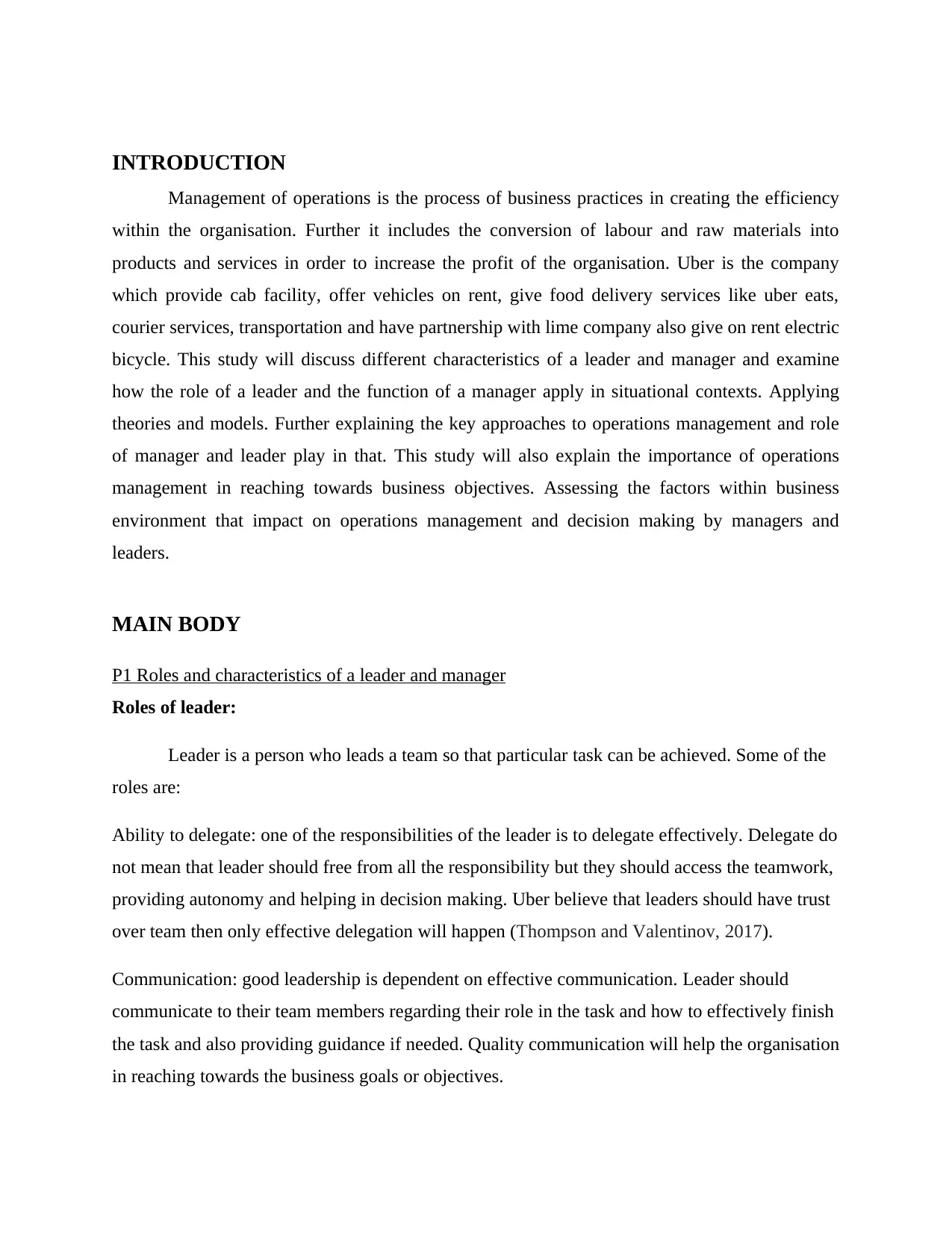
INTRODUCTION
Management of operations is the process of business practices in creating the efficiency
within the organisation. Further it includes the conversion of labour and raw materials into
products and services in order to increase the profit of the organisation. Uber is the company
which provide cab facility, offer vehicles on rent, give food delivery services like uber eats,
courier services, transportation and have partnership with lime company also give on rent electric
bicycle. This study will discuss different characteristics of a leader and manager and examine
how the role of a leader and the function of a manager apply in situational contexts. Applying
theories and models. Further explaining the key approaches to operations management and role
of manager and leader play in that. This study will also explain the importance of operations
management in reaching towards business objectives. Assessing the factors within business
environment that impact on operations management and decision making by managers and
leaders.
MAIN BODY
P1 Roles and characteristics of a leader and manager
Roles of leader:
Leader is a person who leads a team so that particular task can be achieved. Some of the
roles are:
Ability to delegate: one of the responsibilities of the leader is to delegate effectively. Delegate do
not mean that leader should free from all the responsibility but they should access the teamwork,
providing autonomy and helping in decision making. Uber believe that leaders should have trust
over team then only effective delegation will happen (Thompson and Valentinov, 2017).
Communication: good leadership is dependent on effective communication. Leader should
communicate to their team members regarding their role in the task and how to effectively finish
the task and also providing guidance if needed. Quality communication will help the organisation
in reaching towards the business goals or objectives.
Management of operations is the process of business practices in creating the efficiency
within the organisation. Further it includes the conversion of labour and raw materials into
products and services in order to increase the profit of the organisation. Uber is the company
which provide cab facility, offer vehicles on rent, give food delivery services like uber eats,
courier services, transportation and have partnership with lime company also give on rent electric
bicycle. This study will discuss different characteristics of a leader and manager and examine
how the role of a leader and the function of a manager apply in situational contexts. Applying
theories and models. Further explaining the key approaches to operations management and role
of manager and leader play in that. This study will also explain the importance of operations
management in reaching towards business objectives. Assessing the factors within business
environment that impact on operations management and decision making by managers and
leaders.
MAIN BODY
P1 Roles and characteristics of a leader and manager
Roles of leader:
Leader is a person who leads a team so that particular task can be achieved. Some of the
roles are:
Ability to delegate: one of the responsibilities of the leader is to delegate effectively. Delegate do
not mean that leader should free from all the responsibility but they should access the teamwork,
providing autonomy and helping in decision making. Uber believe that leaders should have trust
over team then only effective delegation will happen (Thompson and Valentinov, 2017).
Communication: good leadership is dependent on effective communication. Leader should
communicate to their team members regarding their role in the task and how to effectively finish
the task and also providing guidance if needed. Quality communication will help the organisation
in reaching towards the business goals or objectives.
⊘ This is a preview!⊘
Do you want full access?
Subscribe today to unlock all pages.

Trusted by 1+ million students worldwide
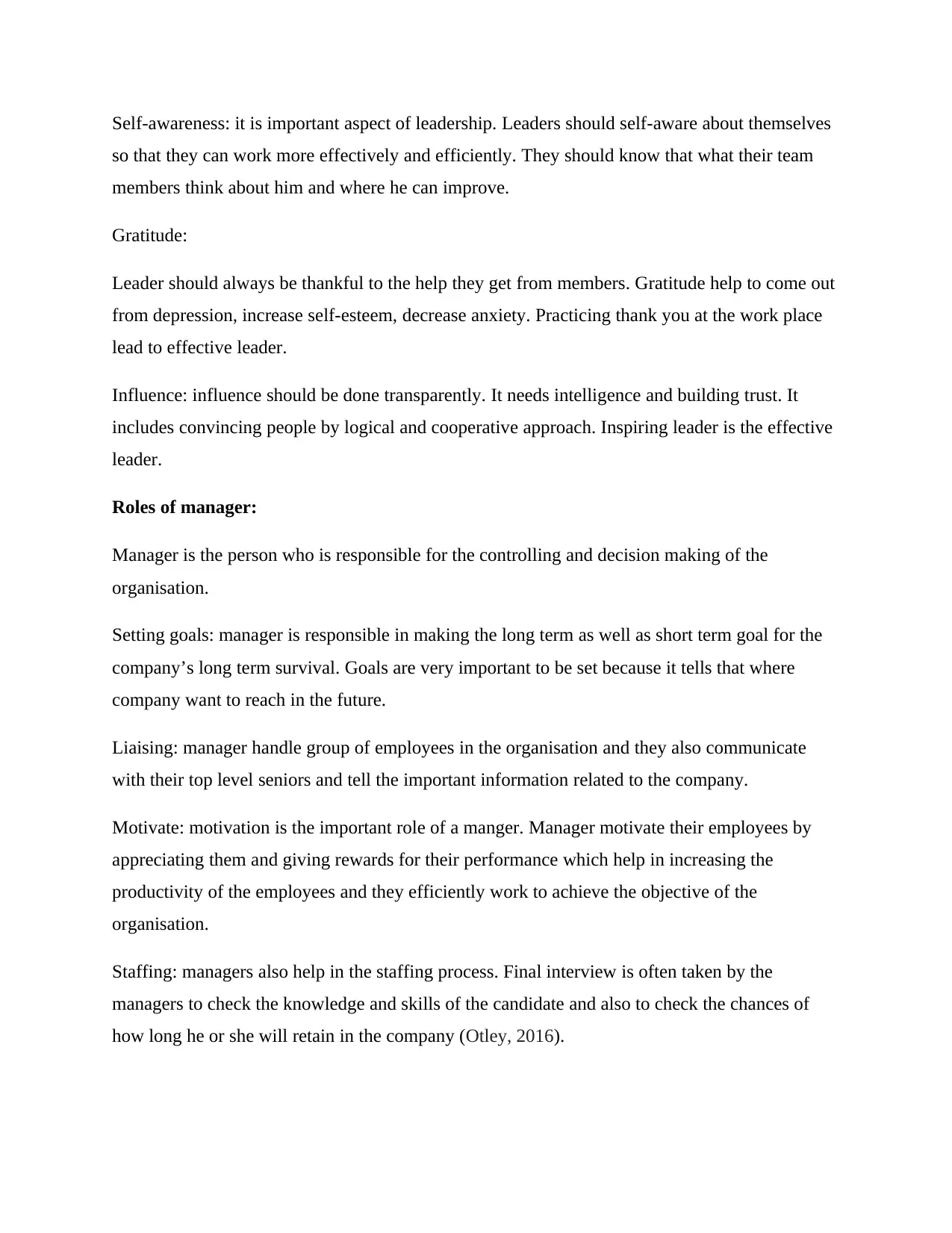
Self-awareness: it is important aspect of leadership. Leaders should self-aware about themselves
so that they can work more effectively and efficiently. They should know that what their team
members think about him and where he can improve.
Gratitude:
Leader should always be thankful to the help they get from members. Gratitude help to come out
from depression, increase self-esteem, decrease anxiety. Practicing thank you at the work place
lead to effective leader.
Influence: influence should be done transparently. It needs intelligence and building trust. It
includes convincing people by logical and cooperative approach. Inspiring leader is the effective
leader.
Roles of manager:
Manager is the person who is responsible for the controlling and decision making of the
organisation.
Setting goals: manager is responsible in making the long term as well as short term goal for the
company’s long term survival. Goals are very important to be set because it tells that where
company want to reach in the future.
Liaising: manager handle group of employees in the organisation and they also communicate
with their top level seniors and tell the important information related to the company.
Motivate: motivation is the important role of a manger. Manager motivate their employees by
appreciating them and giving rewards for their performance which help in increasing the
productivity of the employees and they efficiently work to achieve the objective of the
organisation.
Staffing: managers also help in the staffing process. Final interview is often taken by the
managers to check the knowledge and skills of the candidate and also to check the chances of
how long he or she will retain in the company (Otley, 2016).
so that they can work more effectively and efficiently. They should know that what their team
members think about him and where he can improve.
Gratitude:
Leader should always be thankful to the help they get from members. Gratitude help to come out
from depression, increase self-esteem, decrease anxiety. Practicing thank you at the work place
lead to effective leader.
Influence: influence should be done transparently. It needs intelligence and building trust. It
includes convincing people by logical and cooperative approach. Inspiring leader is the effective
leader.
Roles of manager:
Manager is the person who is responsible for the controlling and decision making of the
organisation.
Setting goals: manager is responsible in making the long term as well as short term goal for the
company’s long term survival. Goals are very important to be set because it tells that where
company want to reach in the future.
Liaising: manager handle group of employees in the organisation and they also communicate
with their top level seniors and tell the important information related to the company.
Motivate: motivation is the important role of a manger. Manager motivate their employees by
appreciating them and giving rewards for their performance which help in increasing the
productivity of the employees and they efficiently work to achieve the objective of the
organisation.
Staffing: managers also help in the staffing process. Final interview is often taken by the
managers to check the knowledge and skills of the candidate and also to check the chances of
how long he or she will retain in the company (Otley, 2016).
Paraphrase This Document
Need a fresh take? Get an instant paraphrase of this document with our AI Paraphraser
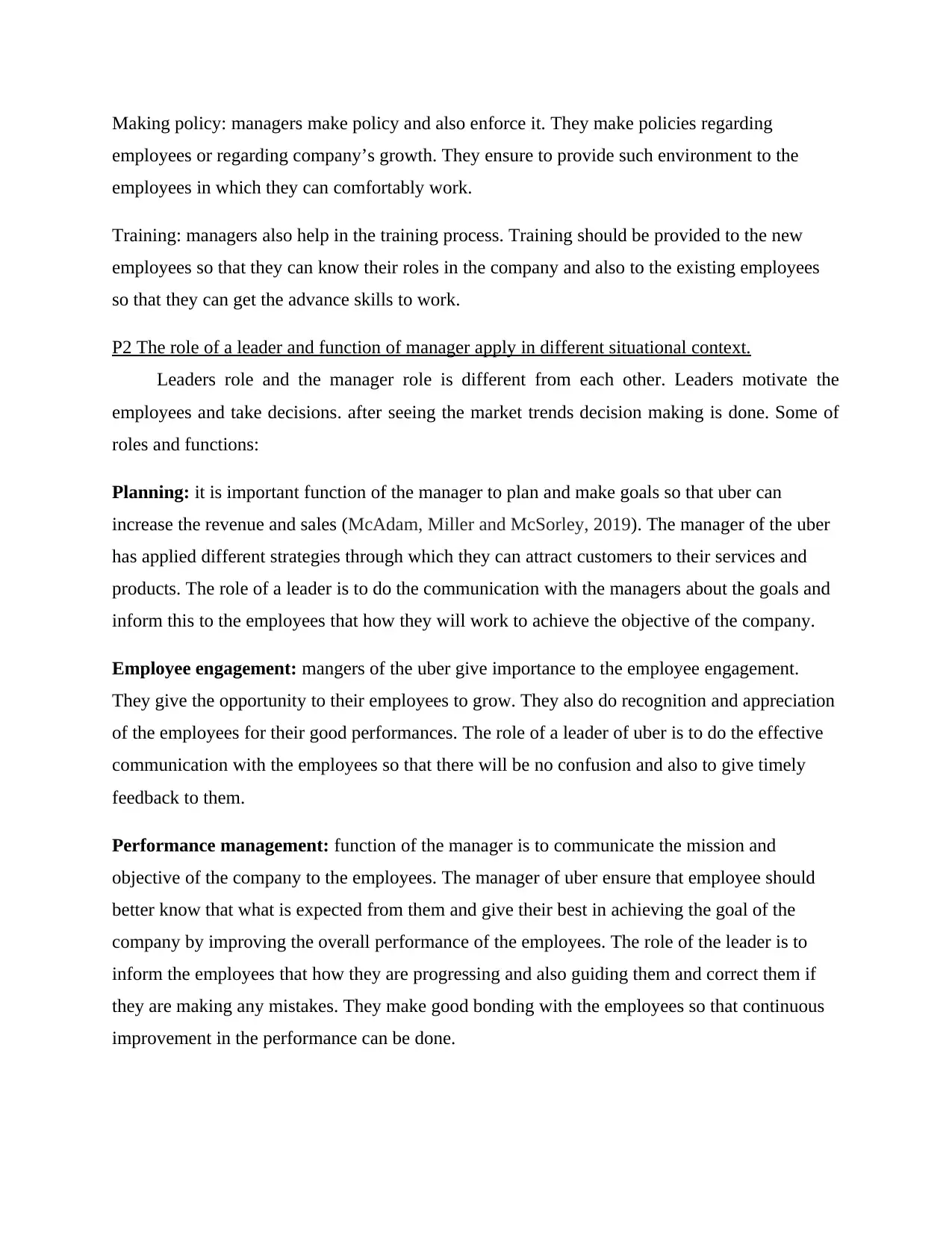
Making policy: managers make policy and also enforce it. They make policies regarding
employees or regarding company’s growth. They ensure to provide such environment to the
employees in which they can comfortably work.
Training: managers also help in the training process. Training should be provided to the new
employees so that they can know their roles in the company and also to the existing employees
so that they can get the advance skills to work.
P2 The role of a leader and function of manager apply in different situational context.
Leaders role and the manager role is different from each other. Leaders motivate the
employees and take decisions. after seeing the market trends decision making is done. Some of
roles and functions:
Planning: it is important function of the manager to plan and make goals so that uber can
increase the revenue and sales (McAdam, Miller and McSorley, 2019). The manager of the uber
has applied different strategies through which they can attract customers to their services and
products. The role of a leader is to do the communication with the managers about the goals and
inform this to the employees that how they will work to achieve the objective of the company.
Employee engagement: mangers of the uber give importance to the employee engagement.
They give the opportunity to their employees to grow. They also do recognition and appreciation
of the employees for their good performances. The role of a leader of uber is to do the effective
communication with the employees so that there will be no confusion and also to give timely
feedback to them.
Performance management: function of the manager is to communicate the mission and
objective of the company to the employees. The manager of uber ensure that employee should
better know that what is expected from them and give their best in achieving the goal of the
company by improving the overall performance of the employees. The role of the leader is to
inform the employees that how they are progressing and also guiding them and correct them if
they are making any mistakes. They make good bonding with the employees so that continuous
improvement in the performance can be done.
employees or regarding company’s growth. They ensure to provide such environment to the
employees in which they can comfortably work.
Training: managers also help in the training process. Training should be provided to the new
employees so that they can know their roles in the company and also to the existing employees
so that they can get the advance skills to work.
P2 The role of a leader and function of manager apply in different situational context.
Leaders role and the manager role is different from each other. Leaders motivate the
employees and take decisions. after seeing the market trends decision making is done. Some of
roles and functions:
Planning: it is important function of the manager to plan and make goals so that uber can
increase the revenue and sales (McAdam, Miller and McSorley, 2019). The manager of the uber
has applied different strategies through which they can attract customers to their services and
products. The role of a leader is to do the communication with the managers about the goals and
inform this to the employees that how they will work to achieve the objective of the company.
Employee engagement: mangers of the uber give importance to the employee engagement.
They give the opportunity to their employees to grow. They also do recognition and appreciation
of the employees for their good performances. The role of a leader of uber is to do the effective
communication with the employees so that there will be no confusion and also to give timely
feedback to them.
Performance management: function of the manager is to communicate the mission and
objective of the company to the employees. The manager of uber ensure that employee should
better know that what is expected from them and give their best in achieving the goal of the
company by improving the overall performance of the employees. The role of the leader is to
inform the employees that how they are progressing and also guiding them and correct them if
they are making any mistakes. They make good bonding with the employees so that continuous
improvement in the performance can be done.
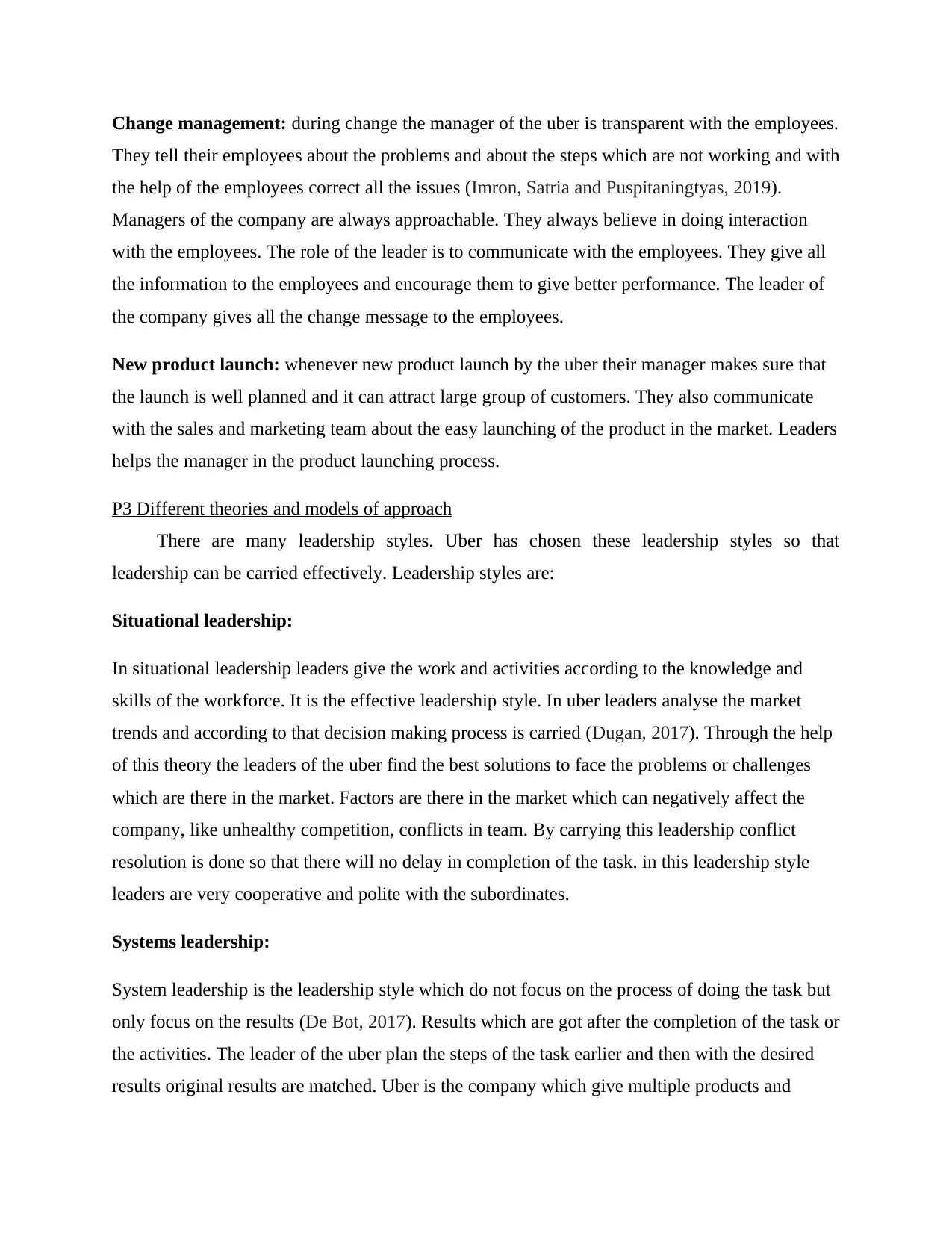
Change management: during change the manager of the uber is transparent with the employees.
They tell their employees about the problems and about the steps which are not working and with
the help of the employees correct all the issues (Imron, Satria and Puspitaningtyas, 2019).
Managers of the company are always approachable. They always believe in doing interaction
with the employees. The role of the leader is to communicate with the employees. They give all
the information to the employees and encourage them to give better performance. The leader of
the company gives all the change message to the employees.
New product launch: whenever new product launch by the uber their manager makes sure that
the launch is well planned and it can attract large group of customers. They also communicate
with the sales and marketing team about the easy launching of the product in the market. Leaders
helps the manager in the product launching process.
P3 Different theories and models of approach
There are many leadership styles. Uber has chosen these leadership styles so that
leadership can be carried effectively. Leadership styles are:
Situational leadership:
In situational leadership leaders give the work and activities according to the knowledge and
skills of the workforce. It is the effective leadership style. In uber leaders analyse the market
trends and according to that decision making process is carried (Dugan, 2017). Through the help
of this theory the leaders of the uber find the best solutions to face the problems or challenges
which are there in the market. Factors are there in the market which can negatively affect the
company, like unhealthy competition, conflicts in team. By carrying this leadership conflict
resolution is done so that there will no delay in completion of the task. in this leadership style
leaders are very cooperative and polite with the subordinates.
Systems leadership:
System leadership is the leadership style which do not focus on the process of doing the task but
only focus on the results (De Bot, 2017). Results which are got after the completion of the task or
the activities. The leader of the uber plan the steps of the task earlier and then with the desired
results original results are matched. Uber is the company which give multiple products and
They tell their employees about the problems and about the steps which are not working and with
the help of the employees correct all the issues (Imron, Satria and Puspitaningtyas, 2019).
Managers of the company are always approachable. They always believe in doing interaction
with the employees. The role of the leader is to communicate with the employees. They give all
the information to the employees and encourage them to give better performance. The leader of
the company gives all the change message to the employees.
New product launch: whenever new product launch by the uber their manager makes sure that
the launch is well planned and it can attract large group of customers. They also communicate
with the sales and marketing team about the easy launching of the product in the market. Leaders
helps the manager in the product launching process.
P3 Different theories and models of approach
There are many leadership styles. Uber has chosen these leadership styles so that
leadership can be carried effectively. Leadership styles are:
Situational leadership:
In situational leadership leaders give the work and activities according to the knowledge and
skills of the workforce. It is the effective leadership style. In uber leaders analyse the market
trends and according to that decision making process is carried (Dugan, 2017). Through the help
of this theory the leaders of the uber find the best solutions to face the problems or challenges
which are there in the market. Factors are there in the market which can negatively affect the
company, like unhealthy competition, conflicts in team. By carrying this leadership conflict
resolution is done so that there will no delay in completion of the task. in this leadership style
leaders are very cooperative and polite with the subordinates.
Systems leadership:
System leadership is the leadership style which do not focus on the process of doing the task but
only focus on the results (De Bot, 2017). Results which are got after the completion of the task or
the activities. The leader of the uber plan the steps of the task earlier and then with the desired
results original results are matched. Uber is the company which give multiple products and
⊘ This is a preview!⊘
Do you want full access?
Subscribe today to unlock all pages.

Trusted by 1+ million students worldwide
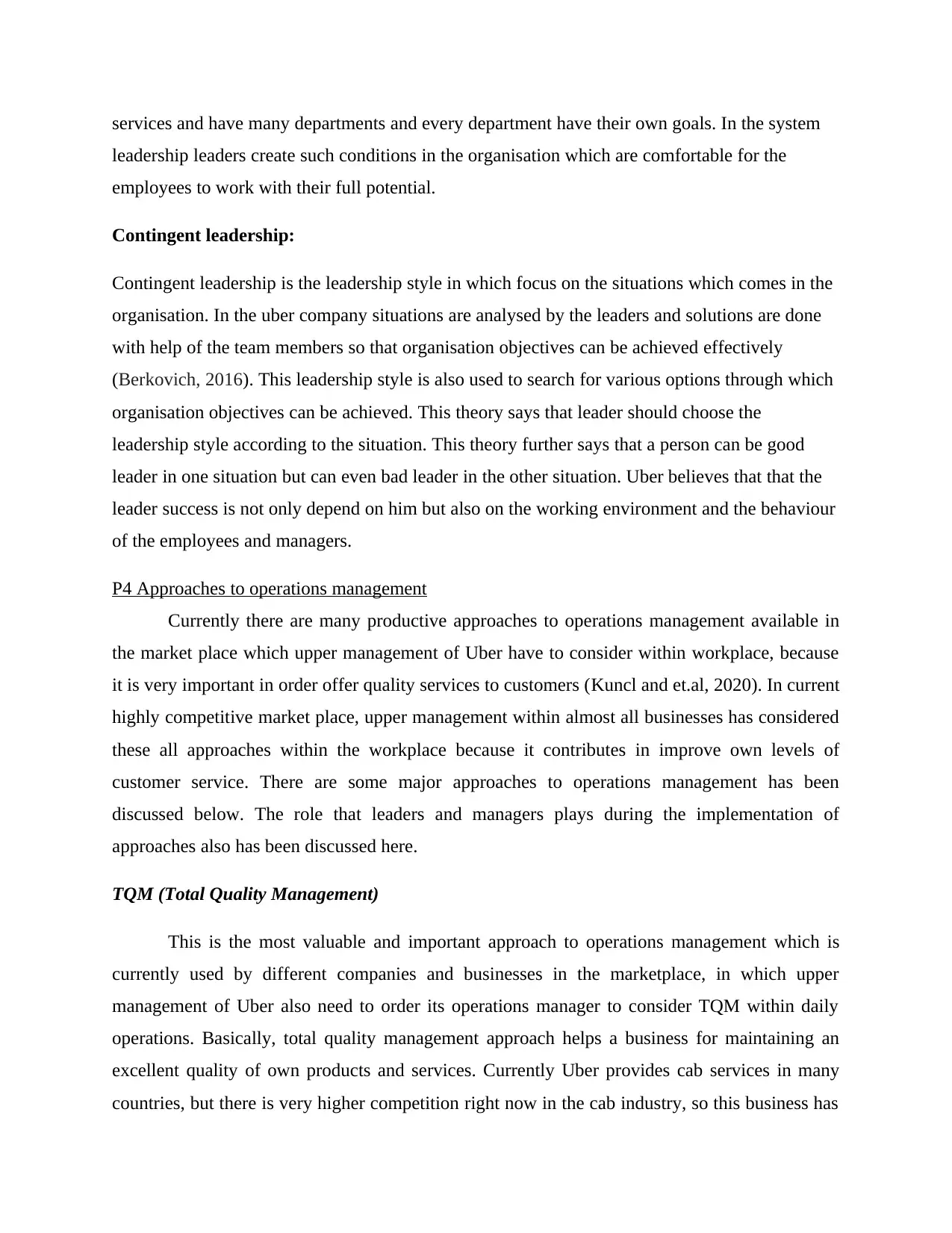
services and have many departments and every department have their own goals. In the system
leadership leaders create such conditions in the organisation which are comfortable for the
employees to work with their full potential.
Contingent leadership:
Contingent leadership is the leadership style in which focus on the situations which comes in the
organisation. In the uber company situations are analysed by the leaders and solutions are done
with help of the team members so that organisation objectives can be achieved effectively
(Berkovich, 2016). This leadership style is also used to search for various options through which
organisation objectives can be achieved. This theory says that leader should choose the
leadership style according to the situation. This theory further says that a person can be good
leader in one situation but can even bad leader in the other situation. Uber believes that that the
leader success is not only depend on him but also on the working environment and the behaviour
of the employees and managers.
P4 Approaches to operations management
Currently there are many productive approaches to operations management available in
the market place which upper management of Uber have to consider within workplace, because
it is very important in order offer quality services to customers (Kuncl and et.al, 2020). In current
highly competitive market place, upper management within almost all businesses has considered
these all approaches within the workplace because it contributes in improve own levels of
customer service. There are some major approaches to operations management has been
discussed below. The role that leaders and managers plays during the implementation of
approaches also has been discussed here.
TQM (Total Quality Management)
This is the most valuable and important approach to operations management which is
currently used by different companies and businesses in the marketplace, in which upper
management of Uber also need to order its operations manager to consider TQM within daily
operations. Basically, total quality management approach helps a business for maintaining an
excellent quality of own products and services. Currently Uber provides cab services in many
countries, but there is very higher competition right now in the cab industry, so this business has
leadership leaders create such conditions in the organisation which are comfortable for the
employees to work with their full potential.
Contingent leadership:
Contingent leadership is the leadership style in which focus on the situations which comes in the
organisation. In the uber company situations are analysed by the leaders and solutions are done
with help of the team members so that organisation objectives can be achieved effectively
(Berkovich, 2016). This leadership style is also used to search for various options through which
organisation objectives can be achieved. This theory says that leader should choose the
leadership style according to the situation. This theory further says that a person can be good
leader in one situation but can even bad leader in the other situation. Uber believes that that the
leader success is not only depend on him but also on the working environment and the behaviour
of the employees and managers.
P4 Approaches to operations management
Currently there are many productive approaches to operations management available in
the market place which upper management of Uber have to consider within workplace, because
it is very important in order offer quality services to customers (Kuncl and et.al, 2020). In current
highly competitive market place, upper management within almost all businesses has considered
these all approaches within the workplace because it contributes in improve own levels of
customer service. There are some major approaches to operations management has been
discussed below. The role that leaders and managers plays during the implementation of
approaches also has been discussed here.
TQM (Total Quality Management)
This is the most valuable and important approach to operations management which is
currently used by different companies and businesses in the marketplace, in which upper
management of Uber also need to order its operations manager to consider TQM within daily
operations. Basically, total quality management approach helps a business for maintaining an
excellent quality of own products and services. Currently Uber provides cab services in many
countries, but there is very higher competition right now in the cab industry, so this business has
Paraphrase This Document
Need a fresh take? Get an instant paraphrase of this document with our AI Paraphraser
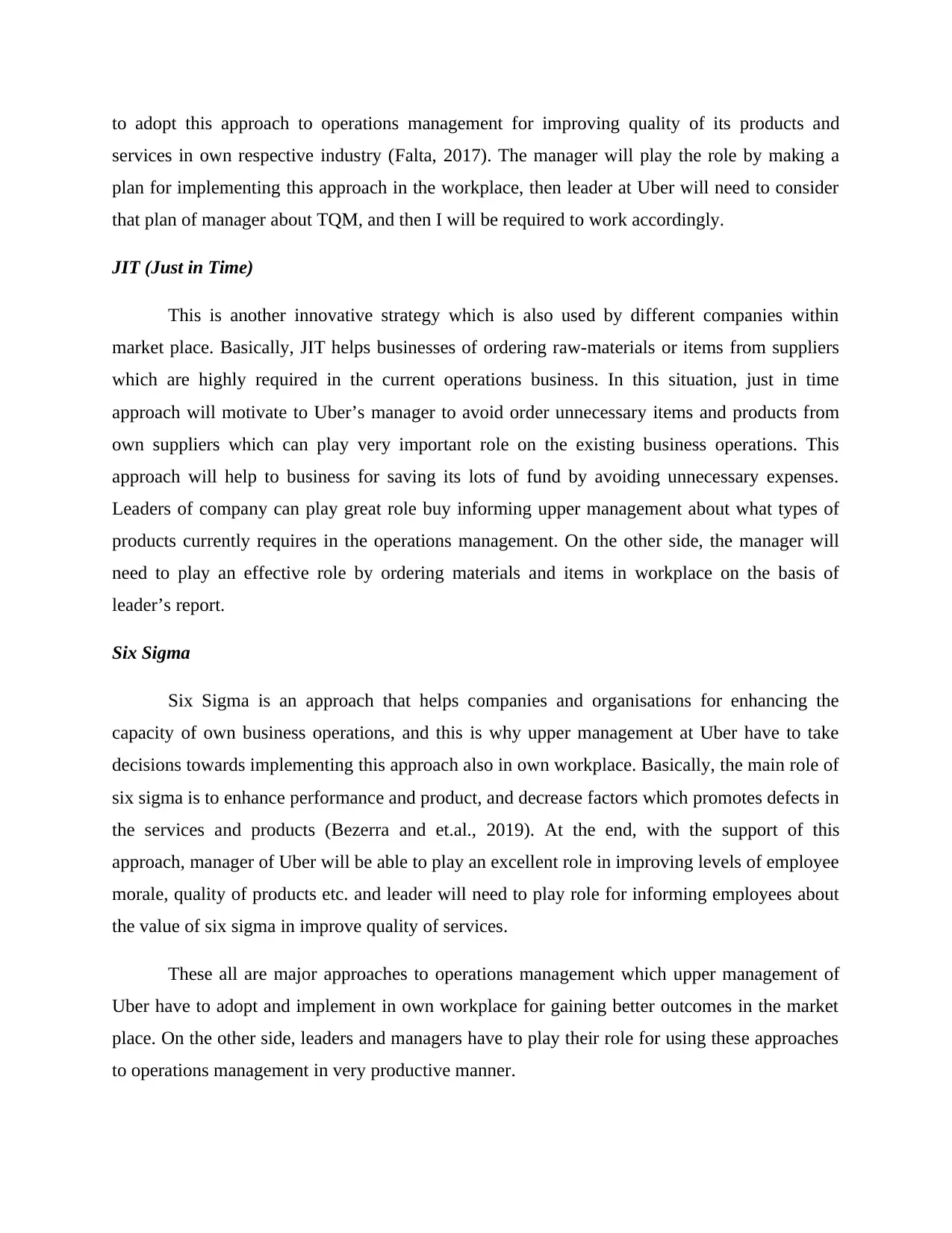
to adopt this approach to operations management for improving quality of its products and
services in own respective industry (Falta, 2017). The manager will play the role by making a
plan for implementing this approach in the workplace, then leader at Uber will need to consider
that plan of manager about TQM, and then I will be required to work accordingly.
JIT (Just in Time)
This is another innovative strategy which is also used by different companies within
market place. Basically, JIT helps businesses of ordering raw-materials or items from suppliers
which are highly required in the current operations business. In this situation, just in time
approach will motivate to Uber’s manager to avoid order unnecessary items and products from
own suppliers which can play very important role on the existing business operations. This
approach will help to business for saving its lots of fund by avoiding unnecessary expenses.
Leaders of company can play great role buy informing upper management about what types of
products currently requires in the operations management. On the other side, the manager will
need to play an effective role by ordering materials and items in workplace on the basis of
leader’s report.
Six Sigma
Six Sigma is an approach that helps companies and organisations for enhancing the
capacity of own business operations, and this is why upper management at Uber have to take
decisions towards implementing this approach also in own workplace. Basically, the main role of
six sigma is to enhance performance and product, and decrease factors which promotes defects in
the services and products (Bezerra and et.al., 2019). At the end, with the support of this
approach, manager of Uber will be able to play an excellent role in improving levels of employee
morale, quality of products etc. and leader will need to play role for informing employees about
the value of six sigma in improve quality of services.
These all are major approaches to operations management which upper management of
Uber have to adopt and implement in own workplace for gaining better outcomes in the market
place. On the other side, leaders and managers have to play their role for using these approaches
to operations management in very productive manner.
services in own respective industry (Falta, 2017). The manager will play the role by making a
plan for implementing this approach in the workplace, then leader at Uber will need to consider
that plan of manager about TQM, and then I will be required to work accordingly.
JIT (Just in Time)
This is another innovative strategy which is also used by different companies within
market place. Basically, JIT helps businesses of ordering raw-materials or items from suppliers
which are highly required in the current operations business. In this situation, just in time
approach will motivate to Uber’s manager to avoid order unnecessary items and products from
own suppliers which can play very important role on the existing business operations. This
approach will help to business for saving its lots of fund by avoiding unnecessary expenses.
Leaders of company can play great role buy informing upper management about what types of
products currently requires in the operations management. On the other side, the manager will
need to play an effective role by ordering materials and items in workplace on the basis of
leader’s report.
Six Sigma
Six Sigma is an approach that helps companies and organisations for enhancing the
capacity of own business operations, and this is why upper management at Uber have to take
decisions towards implementing this approach also in own workplace. Basically, the main role of
six sigma is to enhance performance and product, and decrease factors which promotes defects in
the services and products (Bezerra and et.al., 2019). At the end, with the support of this
approach, manager of Uber will be able to play an excellent role in improving levels of employee
morale, quality of products etc. and leader will need to play role for informing employees about
the value of six sigma in improve quality of services.
These all are major approaches to operations management which upper management of
Uber have to adopt and implement in own workplace for gaining better outcomes in the market
place. On the other side, leaders and managers have to play their role for using these approaches
to operations management in very productive manner.
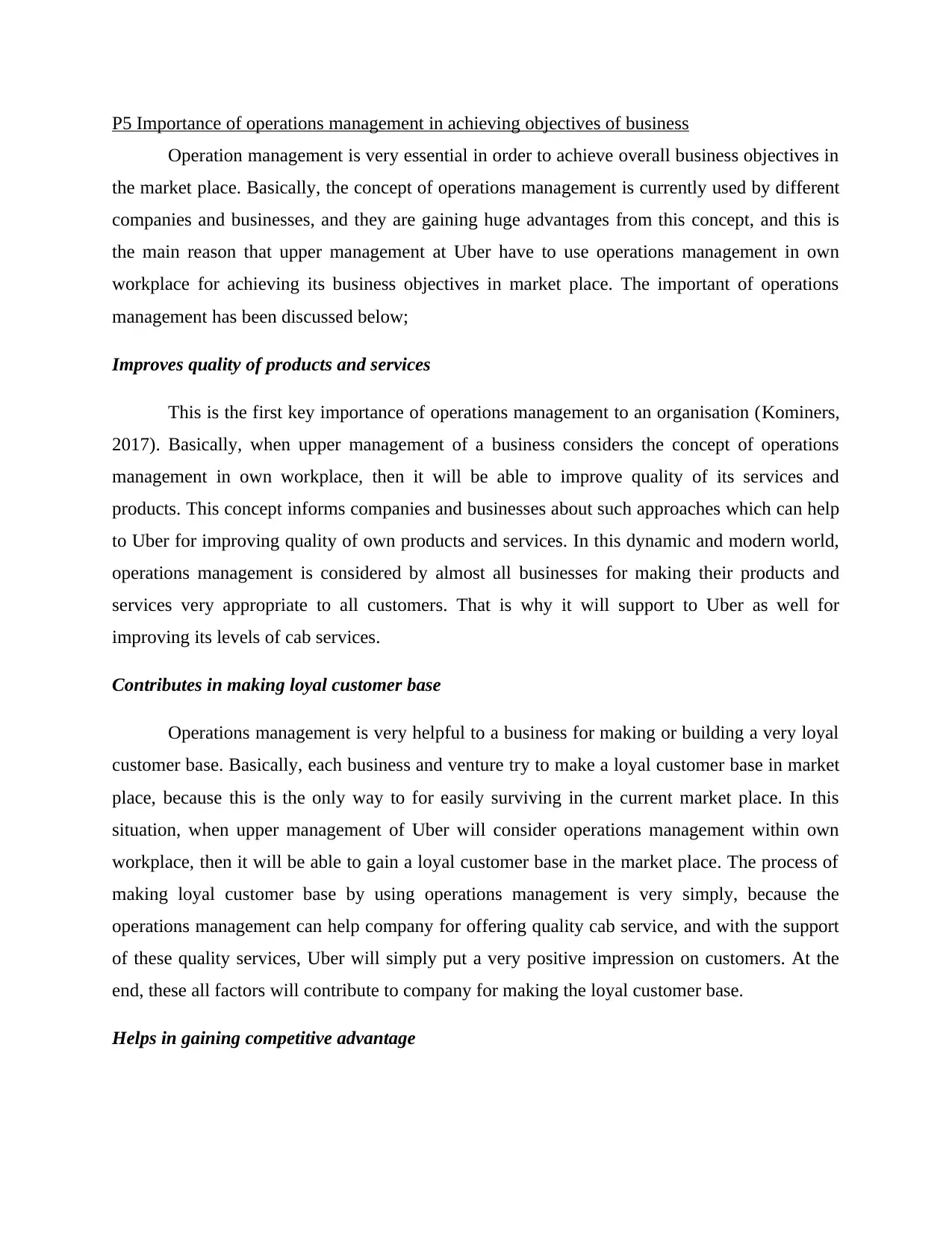
P5 Importance of operations management in achieving objectives of business
Operation management is very essential in order to achieve overall business objectives in
the market place. Basically, the concept of operations management is currently used by different
companies and businesses, and they are gaining huge advantages from this concept, and this is
the main reason that upper management at Uber have to use operations management in own
workplace for achieving its business objectives in market place. The important of operations
management has been discussed below;
Improves quality of products and services
This is the first key importance of operations management to an organisation (Kominers,
2017). Basically, when upper management of a business considers the concept of operations
management in own workplace, then it will be able to improve quality of its services and
products. This concept informs companies and businesses about such approaches which can help
to Uber for improving quality of own products and services. In this dynamic and modern world,
operations management is considered by almost all businesses for making their products and
services very appropriate to all customers. That is why it will support to Uber as well for
improving its levels of cab services.
Contributes in making loyal customer base
Operations management is very helpful to a business for making or building a very loyal
customer base. Basically, each business and venture try to make a loyal customer base in market
place, because this is the only way to for easily surviving in the current market place. In this
situation, when upper management of Uber will consider operations management within own
workplace, then it will be able to gain a loyal customer base in the market place. The process of
making loyal customer base by using operations management is very simply, because the
operations management can help company for offering quality cab service, and with the support
of these quality services, Uber will simply put a very positive impression on customers. At the
end, these all factors will contribute to company for making the loyal customer base.
Helps in gaining competitive advantage
Operation management is very essential in order to achieve overall business objectives in
the market place. Basically, the concept of operations management is currently used by different
companies and businesses, and they are gaining huge advantages from this concept, and this is
the main reason that upper management at Uber have to use operations management in own
workplace for achieving its business objectives in market place. The important of operations
management has been discussed below;
Improves quality of products and services
This is the first key importance of operations management to an organisation (Kominers,
2017). Basically, when upper management of a business considers the concept of operations
management in own workplace, then it will be able to improve quality of its services and
products. This concept informs companies and businesses about such approaches which can help
to Uber for improving quality of own products and services. In this dynamic and modern world,
operations management is considered by almost all businesses for making their products and
services very appropriate to all customers. That is why it will support to Uber as well for
improving its levels of cab services.
Contributes in making loyal customer base
Operations management is very helpful to a business for making or building a very loyal
customer base. Basically, each business and venture try to make a loyal customer base in market
place, because this is the only way to for easily surviving in the current market place. In this
situation, when upper management of Uber will consider operations management within own
workplace, then it will be able to gain a loyal customer base in the market place. The process of
making loyal customer base by using operations management is very simply, because the
operations management can help company for offering quality cab service, and with the support
of these quality services, Uber will simply put a very positive impression on customers. At the
end, these all factors will contribute to company for making the loyal customer base.
Helps in gaining competitive advantage
⊘ This is a preview!⊘
Do you want full access?
Subscribe today to unlock all pages.

Trusted by 1+ million students worldwide
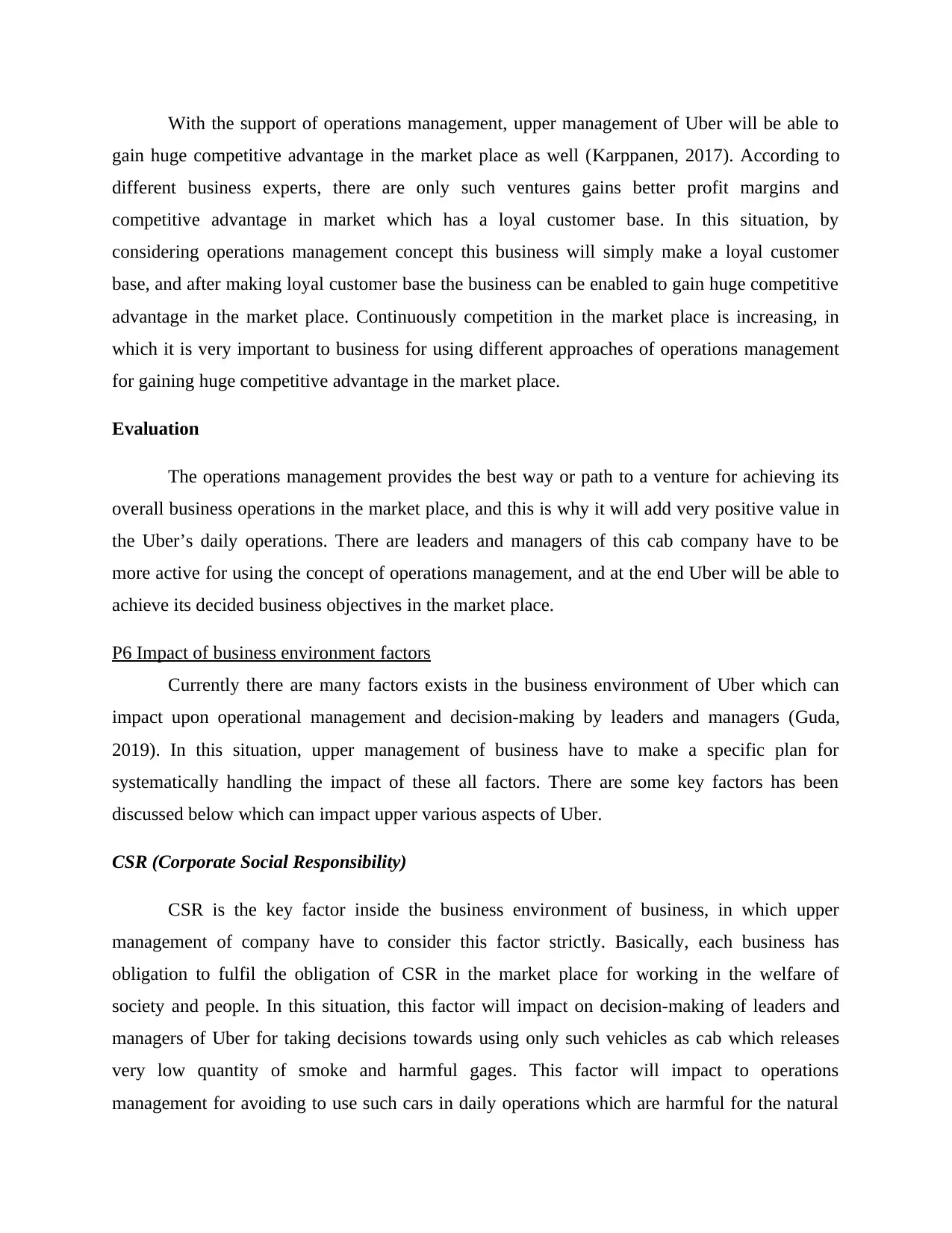
With the support of operations management, upper management of Uber will be able to
gain huge competitive advantage in the market place as well (Karppanen, 2017). According to
different business experts, there are only such ventures gains better profit margins and
competitive advantage in market which has a loyal customer base. In this situation, by
considering operations management concept this business will simply make a loyal customer
base, and after making loyal customer base the business can be enabled to gain huge competitive
advantage in the market place. Continuously competition in the market place is increasing, in
which it is very important to business for using different approaches of operations management
for gaining huge competitive advantage in the market place.
Evaluation
The operations management provides the best way or path to a venture for achieving its
overall business operations in the market place, and this is why it will add very positive value in
the Uber’s daily operations. There are leaders and managers of this cab company have to be
more active for using the concept of operations management, and at the end Uber will be able to
achieve its decided business objectives in the market place.
P6 Impact of business environment factors
Currently there are many factors exists in the business environment of Uber which can
impact upon operational management and decision-making by leaders and managers (Guda,
2019). In this situation, upper management of business have to make a specific plan for
systematically handling the impact of these all factors. There are some key factors has been
discussed below which can impact upper various aspects of Uber.
CSR (Corporate Social Responsibility)
CSR is the key factor inside the business environment of business, in which upper
management of company have to consider this factor strictly. Basically, each business has
obligation to fulfil the obligation of CSR in the market place for working in the welfare of
society and people. In this situation, this factor will impact on decision-making of leaders and
managers of Uber for taking decisions towards using only such vehicles as cab which releases
very low quantity of smoke and harmful gages. This factor will impact to operations
management for avoiding to use such cars in daily operations which are harmful for the natural
gain huge competitive advantage in the market place as well (Karppanen, 2017). According to
different business experts, there are only such ventures gains better profit margins and
competitive advantage in market which has a loyal customer base. In this situation, by
considering operations management concept this business will simply make a loyal customer
base, and after making loyal customer base the business can be enabled to gain huge competitive
advantage in the market place. Continuously competition in the market place is increasing, in
which it is very important to business for using different approaches of operations management
for gaining huge competitive advantage in the market place.
Evaluation
The operations management provides the best way or path to a venture for achieving its
overall business operations in the market place, and this is why it will add very positive value in
the Uber’s daily operations. There are leaders and managers of this cab company have to be
more active for using the concept of operations management, and at the end Uber will be able to
achieve its decided business objectives in the market place.
P6 Impact of business environment factors
Currently there are many factors exists in the business environment of Uber which can
impact upon operational management and decision-making by leaders and managers (Guda,
2019). In this situation, upper management of business have to make a specific plan for
systematically handling the impact of these all factors. There are some key factors has been
discussed below which can impact upper various aspects of Uber.
CSR (Corporate Social Responsibility)
CSR is the key factor inside the business environment of business, in which upper
management of company have to consider this factor strictly. Basically, each business has
obligation to fulfil the obligation of CSR in the market place for working in the welfare of
society and people. In this situation, this factor will impact on decision-making of leaders and
managers of Uber for taking decisions towards using only such vehicles as cab which releases
very low quantity of smoke and harmful gages. This factor will impact to operations
management for avoiding to use such cars in daily operations which are harmful for the natural
Paraphrase This Document
Need a fresh take? Get an instant paraphrase of this document with our AI Paraphraser
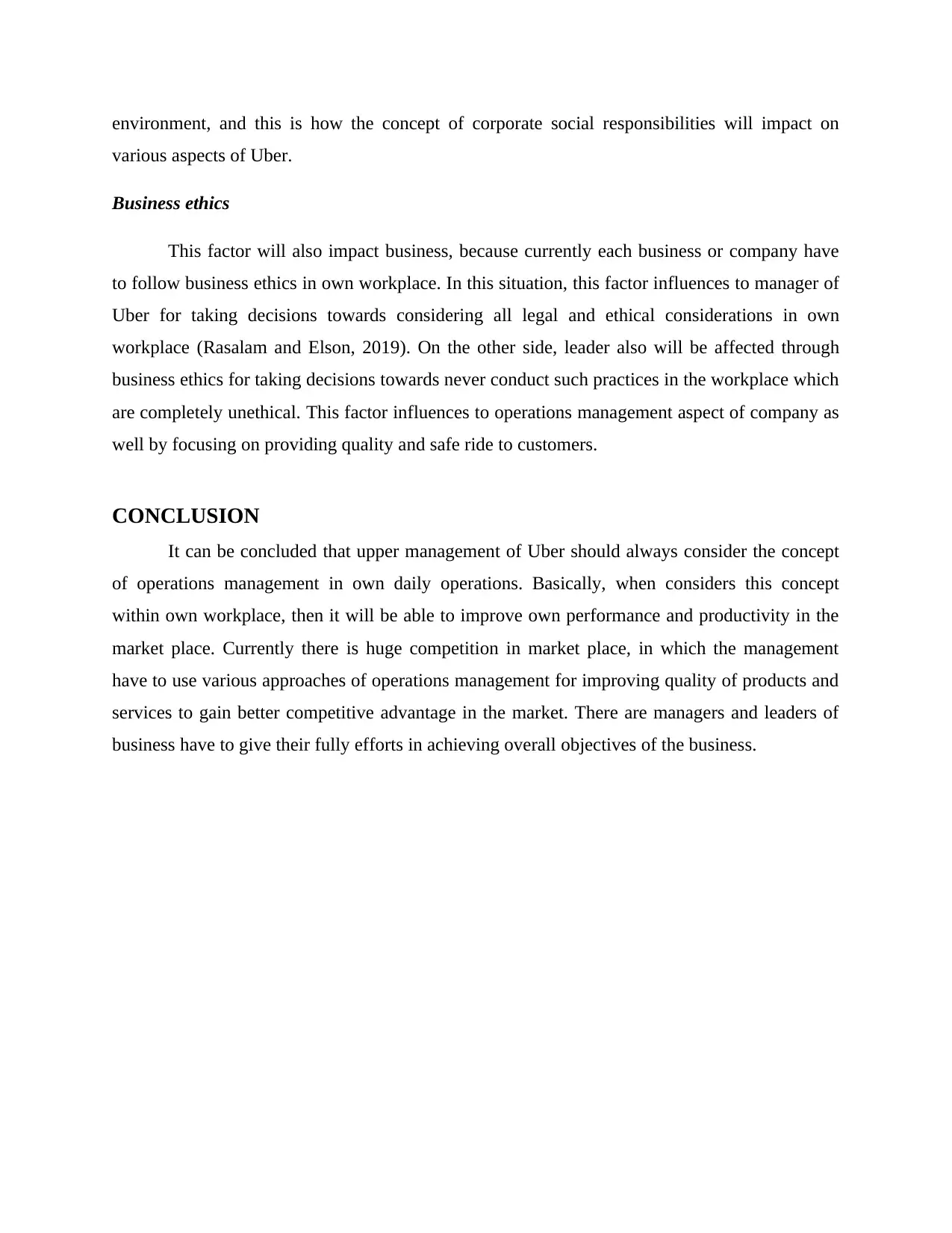
environment, and this is how the concept of corporate social responsibilities will impact on
various aspects of Uber.
Business ethics
This factor will also impact business, because currently each business or company have
to follow business ethics in own workplace. In this situation, this factor influences to manager of
Uber for taking decisions towards considering all legal and ethical considerations in own
workplace (Rasalam and Elson, 2019). On the other side, leader also will be affected through
business ethics for taking decisions towards never conduct such practices in the workplace which
are completely unethical. This factor influences to operations management aspect of company as
well by focusing on providing quality and safe ride to customers.
CONCLUSION
It can be concluded that upper management of Uber should always consider the concept
of operations management in own daily operations. Basically, when considers this concept
within own workplace, then it will be able to improve own performance and productivity in the
market place. Currently there is huge competition in market place, in which the management
have to use various approaches of operations management for improving quality of products and
services to gain better competitive advantage in the market. There are managers and leaders of
business have to give their fully efforts in achieving overall objectives of the business.
various aspects of Uber.
Business ethics
This factor will also impact business, because currently each business or company have
to follow business ethics in own workplace. In this situation, this factor influences to manager of
Uber for taking decisions towards considering all legal and ethical considerations in own
workplace (Rasalam and Elson, 2019). On the other side, leader also will be affected through
business ethics for taking decisions towards never conduct such practices in the workplace which
are completely unethical. This factor influences to operations management aspect of company as
well by focusing on providing quality and safe ride to customers.
CONCLUSION
It can be concluded that upper management of Uber should always consider the concept
of operations management in own daily operations. Basically, when considers this concept
within own workplace, then it will be able to improve own performance and productivity in the
market place. Currently there is huge competition in market place, in which the management
have to use various approaches of operations management for improving quality of products and
services to gain better competitive advantage in the market. There are managers and leaders of
business have to give their fully efforts in achieving overall objectives of the business.
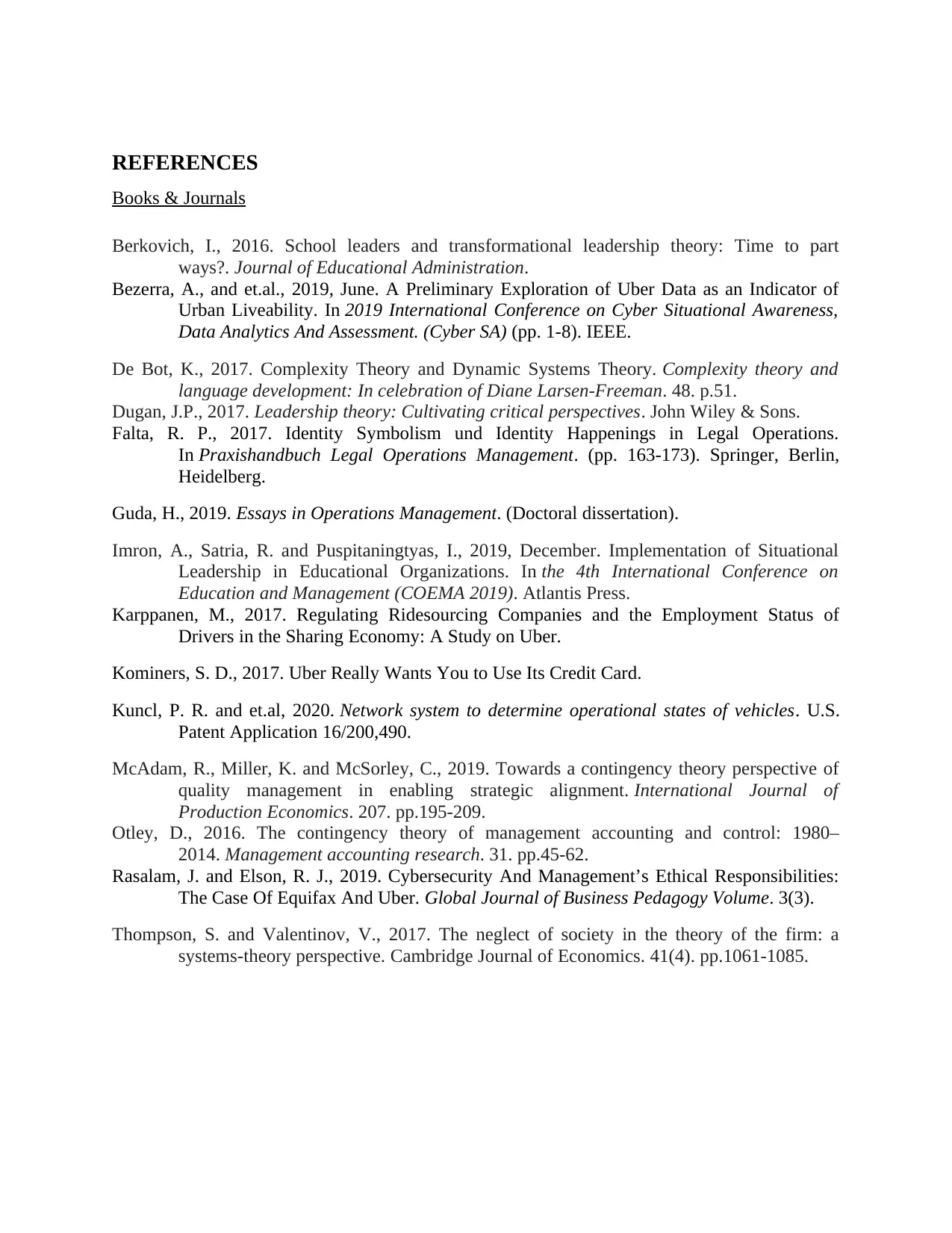
REFERENCES
Books & Journals
Berkovich, I., 2016. School leaders and transformational leadership theory: Time to part
ways?. Journal of Educational Administration.
Bezerra, A., and et.al., 2019, June. A Preliminary Exploration of Uber Data as an Indicator of
Urban Liveability. In 2019 International Conference on Cyber Situational Awareness,
Data Analytics And Assessment. (Cyber SA) (pp. 1-8). IEEE.
De Bot, K., 2017. Complexity Theory and Dynamic Systems Theory. Complexity theory and
language development: In celebration of Diane Larsen-Freeman. 48. p.51.
Dugan, J.P., 2017. Leadership theory: Cultivating critical perspectives. John Wiley & Sons.
Falta, R. P., 2017. Identity Symbolism und Identity Happenings in Legal Operations.
In Praxishandbuch Legal Operations Management. (pp. 163-173). Springer, Berlin,
Heidelberg.
Guda, H., 2019. Essays in Operations Management. (Doctoral dissertation).
Imron, A., Satria, R. and Puspitaningtyas, I., 2019, December. Implementation of Situational
Leadership in Educational Organizations. In the 4th International Conference on
Education and Management (COEMA 2019). Atlantis Press.
Karppanen, M., 2017. Regulating Ridesourcing Companies and the Employment Status of
Drivers in the Sharing Economy: A Study on Uber.
Kominers, S. D., 2017. Uber Really Wants You to Use Its Credit Card.
Kuncl, P. R. and et.al, 2020. Network system to determine operational states of vehicles. U.S.
Patent Application 16/200,490.
McAdam, R., Miller, K. and McSorley, C., 2019. Towards a contingency theory perspective of
quality management in enabling strategic alignment. International Journal of
Production Economics. 207. pp.195-209.
Otley, D., 2016. The contingency theory of management accounting and control: 1980–
2014. Management accounting research. 31. pp.45-62.
Rasalam, J. and Elson, R. J., 2019. Cybersecurity And Management’s Ethical Responsibilities:
The Case Of Equifax And Uber. Global Journal of Business Pedagogy Volume. 3(3).
Thompson, S. and Valentinov, V., 2017. The neglect of society in the theory of the firm: a
systems-theory perspective. Cambridge Journal of Economics. 41(4). pp.1061-1085.
Books & Journals
Berkovich, I., 2016. School leaders and transformational leadership theory: Time to part
ways?. Journal of Educational Administration.
Bezerra, A., and et.al., 2019, June. A Preliminary Exploration of Uber Data as an Indicator of
Urban Liveability. In 2019 International Conference on Cyber Situational Awareness,
Data Analytics And Assessment. (Cyber SA) (pp. 1-8). IEEE.
De Bot, K., 2017. Complexity Theory and Dynamic Systems Theory. Complexity theory and
language development: In celebration of Diane Larsen-Freeman. 48. p.51.
Dugan, J.P., 2017. Leadership theory: Cultivating critical perspectives. John Wiley & Sons.
Falta, R. P., 2017. Identity Symbolism und Identity Happenings in Legal Operations.
In Praxishandbuch Legal Operations Management. (pp. 163-173). Springer, Berlin,
Heidelberg.
Guda, H., 2019. Essays in Operations Management. (Doctoral dissertation).
Imron, A., Satria, R. and Puspitaningtyas, I., 2019, December. Implementation of Situational
Leadership in Educational Organizations. In the 4th International Conference on
Education and Management (COEMA 2019). Atlantis Press.
Karppanen, M., 2017. Regulating Ridesourcing Companies and the Employment Status of
Drivers in the Sharing Economy: A Study on Uber.
Kominers, S. D., 2017. Uber Really Wants You to Use Its Credit Card.
Kuncl, P. R. and et.al, 2020. Network system to determine operational states of vehicles. U.S.
Patent Application 16/200,490.
McAdam, R., Miller, K. and McSorley, C., 2019. Towards a contingency theory perspective of
quality management in enabling strategic alignment. International Journal of
Production Economics. 207. pp.195-209.
Otley, D., 2016. The contingency theory of management accounting and control: 1980–
2014. Management accounting research. 31. pp.45-62.
Rasalam, J. and Elson, R. J., 2019. Cybersecurity And Management’s Ethical Responsibilities:
The Case Of Equifax And Uber. Global Journal of Business Pedagogy Volume. 3(3).
Thompson, S. and Valentinov, V., 2017. The neglect of society in the theory of the firm: a
systems-theory perspective. Cambridge Journal of Economics. 41(4). pp.1061-1085.
⊘ This is a preview!⊘
Do you want full access?
Subscribe today to unlock all pages.

Trusted by 1+ million students worldwide
1 out of 12
Related Documents
Your All-in-One AI-Powered Toolkit for Academic Success.
+13062052269
info@desklib.com
Available 24*7 on WhatsApp / Email
![[object Object]](/_next/static/media/star-bottom.7253800d.svg)
Unlock your academic potential
Copyright © 2020–2026 A2Z Services. All Rights Reserved. Developed and managed by ZUCOL.




